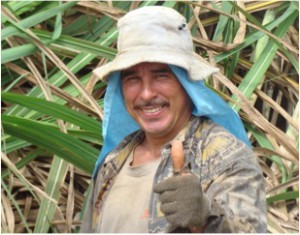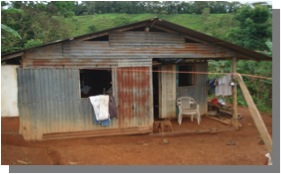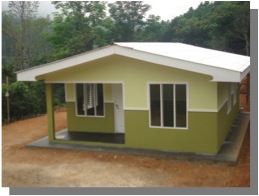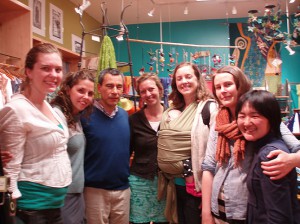
Sachiko (far right), Gilbert (3rd from left), Courtney (2nd from left) with Global Exchange store staff.
The following was written by Global Exchange Fair Trade Store intern Sachiko Muraoka, who will be finishing her work here with us this week. We will be sad to see her go, but excited to see what great things she does next!
—
On Saturday, July 23rd, the Global Exchange Fair Trade Store in Fair Trade Town San Francisco hosted a Fair Trade Talk with Gilbert Ramirez from CoopeAgri in Costa Rica and Courtney Lang from Fair Trade USA. Gilbert’s town Pérez Zeledón is the very first Fair Trade Town in Latin America.
Before the talk, we all enjoyed tasty Fair Trade Peace Coffee. Yum! Then Courtney started off the event with a brief introduction to Fair Trade.
 Next, Gilbert shared his experiences with and visions of his coffee and sugar cooperative, CoopeAgri, which at the beginning had more than 300 farmers.
Next, Gilbert shared his experiences with and visions of his coffee and sugar cooperative, CoopeAgri, which at the beginning had more than 300 farmers. 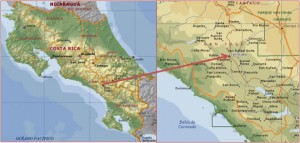 It is located in Pérez Zeledón, a biologically diverse city in the central valley of Costa Rica. By 2010, about 12,000 members have joined the cooperative, 65% male and 35% female members.
It is located in Pérez Zeledón, a biologically diverse city in the central valley of Costa Rica. By 2010, about 12,000 members have joined the cooperative, 65% male and 35% female members.
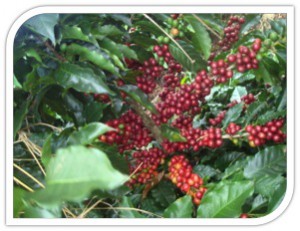 The cooperative was established in 1962, before the Fair Trade movement was established. CoopeAgri started a Fair Trade development model in 1994. They are committed to producing sustainably produced coffee and sugar. For example, their coffee mill conserves the use of water and energy and they practice forest protection programs. Most of their coffee is exported overseas, especially since their coffee became Fair Trade Certified in 1994.
The cooperative was established in 1962, before the Fair Trade movement was established. CoopeAgri started a Fair Trade development model in 1994. They are committed to producing sustainably produced coffee and sugar. For example, their coffee mill conserves the use of water and energy and they practice forest protection programs. Most of their coffee is exported overseas, especially since their coffee became Fair Trade Certified in 1994.
Their coffee sales have increased dramatically over time, but they’re hoping to grow much more moving forward. The cooperative exports their coffee to more than 70 countries but their coffee is not being distributed in the United States as much as Gilbert would like. At this point, CoopeAgri exports 70% of its coffee to Europe and 16 % to the United States.
Gilbert told us that they are aiming to export more coffee to the US and that during his trip here one of his main goals was to explore how to make this a reality. According to The Coffee Book by Nina Luttinger and Gregory Dicum, 1.5 millon cups of coffee is being consumed worldwide every day and the U.S. represents one-fifth of it. Given that the U.S. consumes more coffee than any other country, it makes sense that this is a critical goal to coffee cooperatives such as Pérez Zeledón.
Although Fair Trade has been promoted as a means to equalize the economic gap between developed and developing countries, Gilbert mentioned that Fair Trade can offer more personal connections besides its economic and environmental impacts. Fair Trade brings a direct connection between producers from the community, and buyers and customers. This is possible in part because the Fair Trade model cuts out the middlemen usually present in the conventional trade system.
The Fair Trade model also helps fund community development projects, thanks to Fair Trade premiums producers receive. CoopeAgri provides a variety of benefits to its members, including social security and medical, housing funds which more than 70 families have benefited so far, and education and sports programs for children.
The cooperative also provides some social services for community members who do not belong to the group.
CoopeAgri will commemorate its 50 years anniversary next year. We all hope they will maintain and increase their positive development. These days it is not difficult to find Fair Trade coffee in the United States, particularly in a city like San Francisco, with its numerous markets and coffee shops providing Fair Trade coffee. But meeting directly with a coffee producer…so not common!
This event gave me a better understanding of and new perspectives about Fair Trade coffee and its positive impacts on one producer community. Long-term relationships between cooperatives, importers, and customers are important.
A big thanks to Courtney and Gilbert for participating in this event. I’m looking forward to tasting CoopeAgri´s coffee in the United States in the near future. ¡Muchas gracias!
GET INVOLVED:
To keep up-to-date about Global Exchange store happenings & events, join our free Fair Trade Store e-newsletter here and “like” our Fair Trade Facebook page.

